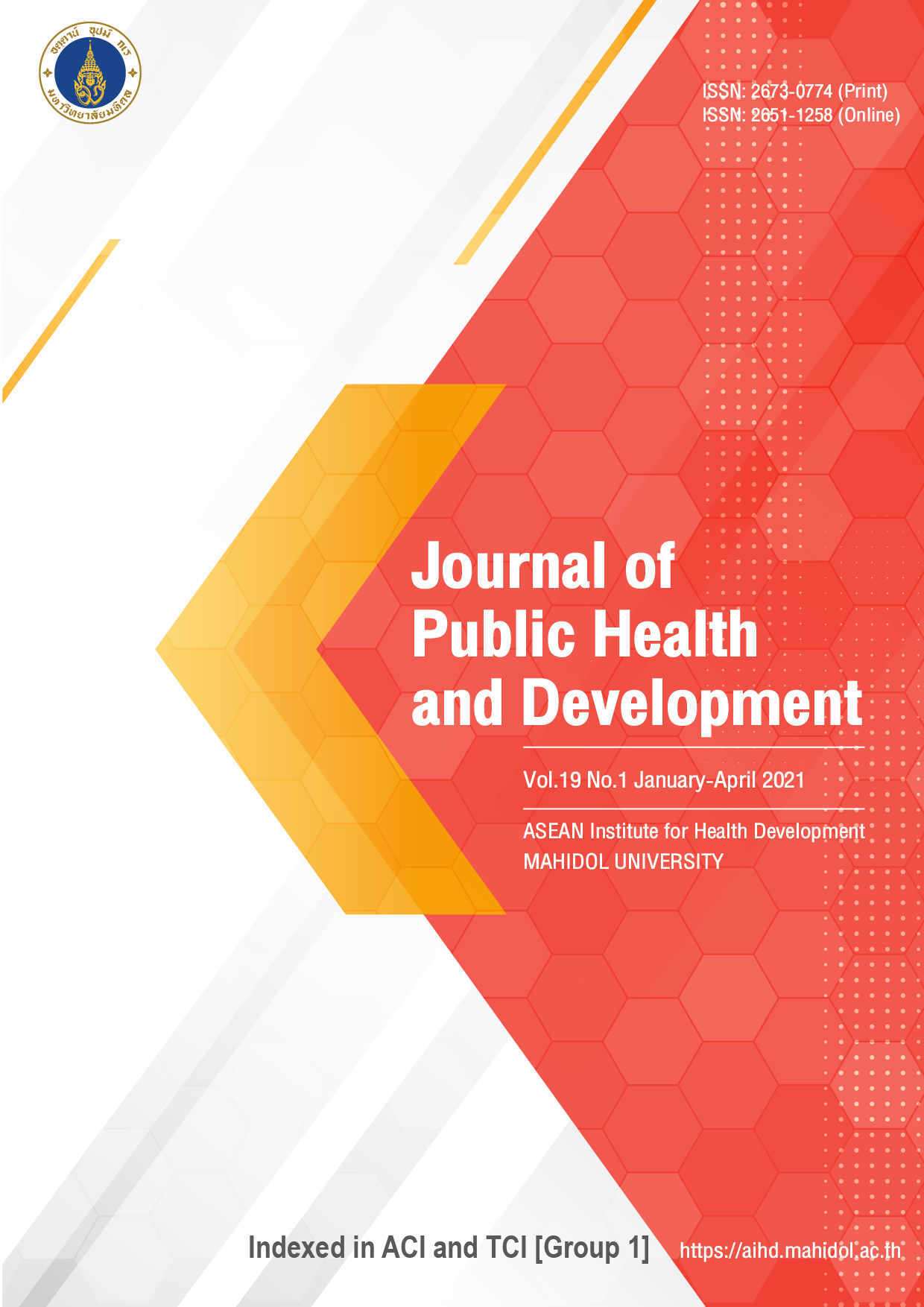Patterns and mechanisms contributing to the males’ positive involvement in reproductive health issues: cases from a peri-urban area of Bangladesh
Main Article Content
Abstract
In a patriarchal society where decisions are largely made by men, the need to include men in reproductive issues are relatively complex with a view to achieving key reproductive health (RH) goals. In SDG goal 5.6, it is emphasized to ensure equal access to sexual and reproductive health and reproductive rights as agreed in accordance with the Programme of Action of the International Conference on Population and Development. The conference advises that efforts should be made to emphasize men’s shared responsibility and promote their active involvement in the RH field. This study intended to explore mechanisms and channels promoting male involvement in RH in Cumilla city, a southeastern urban area of Bangladesh. The qualitative study design was used to figure out transformative and effective reasons which led males to share responsibilities regarding the RH issue. Case study method was adopted as the strategy of inquiry of this qualitative study. This study tried to explore the contextual analysis of male involvement in RH issue. In brief the study asserts the idea that being in the same gendered norms setting, some mechanisms like self-interest, adequate knowledge and awareness, mutual communication, love and affection between spouses, peer-group communication influenced males to actively involve in RH field especially in considering wife’s decision regarding contraceptive use, birth spacing, abortion and accompanying wife during RH serivces. It is recommended that programs on effective implementation of male involvement in RH should address the socio-cultural barriers and challenges to men’s supportive activities. It is a comprehensive task that cannot be achieved in the short-run and requires sustained engagement and commitment by all stakeholders.
Article Details
References
USAID. Challenges and opportunities for male involvement in reproductive health in Cambodia . Phnom Penh POLICY Proj [Internet]. 2005. Available from: http://www. policyproject.com/pubs/countryreports/MaleInvolv_Cam.pdf
Salem R. Men’s surveys: new findings [Internet]. 2004 [cited 2020 Oct 29]. Available from: https://www. researchgate.net/publication/8187490_Men’s_surveys_new_findings
World Health Organization. Sexual and Reproductive Health. World Health Organization [Internet]. 2017 [cited 2020 Oct 29]. Available from: https://www.euro.who.int/__data/assets/pdf_file/0005/348008/Fact-sheet-SDG-SRH-FINAL-04-09-2017.pdf?ua=1
Shattuck D, Kerner B, Gilles K, Hartmann M, Ng’ombe T, Guest G. Encouraging contraceptive uptake by motivating men to communicate about family planning: The Malawi Male Motivator project. Am J Public Health [Internet]. 2011; Available from: https://ajph.aphapublications.org/doi/10.2105/AJPH.2010.300091
Sinha D. Empowering communities to make pregnancy safer: an intervention in rural Andhra Pradesh [Internet]. 2008;(5):1–42. Available from: http://www.popcouncil.org/asia/india.html
C.L. S-R, S. S. Involving husbands in safe motherhood: Effects of the Suami SIAGA Campaign In Indonesia. J Health Commun [Internet]. 2004. Available from: https://www. tandfonline.com/doi/abs/10.1080/10810730490447075
Mullany BC, Becker S, Hindin MJ. The impact of including husbands in antenatal health education services on maternal health practices in urban Nepal: Results from a randomized controlled trial. Health Educ Res [Internet]. 2007. Available from: https://academic.oup.com/her/article/22/2/166/622187
Hartmann M, Gilles K, Shattuck D, Kerner B, Guest G. Changes in couples’ communication as a result of a male-involvement family planning intervention. J Health Commun [Internet]. 2012. Available from: https://www.tandfonline.com/doi/abs/10.1080/10810730.2011.650825
Kamal MM, Islam MS, Alam MS, Hasssn ABME. Determinants of Male Involvement in Family Planning and Reproductive Health in Bangladesh. Am J Hum Ecol. 2013; Available from: http://worldscholars.org/index. php/ajhe/article/view/0202_6
Bishwajit G, Tang S, Yaya S, Ide S, Fu H, Wang M, et al. Factors associated with male involvement in reproductive care in Bangladesh. BMC Public Health [Internet]. 2017. Available from: https://bmcpublichealth. biomedcentral.com/articles/10.1186/s12889-016-3915-y
Pettifor AE, Measham DM, Rees H V., Padian NS. Sexual power and HIV risk, South Africa. In: Emerging Infectious Diseases [Internet]. 2004. Available from: https://wwwnc.cdc. gov/eid/article/10/11/04-0252_article
Blake M, Babalola SCN-I 12-5. Impact of a male motivation campaign on family planning ideation and practice in Guinea. PRISM project [Internet]. 2002;(13):20pp. Available from: http://pdf.usaid.gov/pdf_docs/PNACS563.pdf
Dudgeon MR, Inhorn MC. Men’s influences on women’s reproductive health: Medical anthropological perspectives. Soc Sci Med [Internet]. 2004. Available from: https://www. sciencedirect.com/science/article/abs/pii/S0277953603006282?via%3Dihub
Joshi LR. Male Participation in Family Planning: Human Behaviour Perspective. J Nepal Health Res Counc [Internet]. 2015. Available from: https://pubmed.ncbi.nlm.nih.gov/27005710/
Sharma A. Male Involvement in Reproductive Health: Women’s Perspective. The Journal of Family Welfare [Internet]. 2003. Available form: https://journals.sagepub.com /doi/10.1177/097206340400700109
Courgeau D, Bruijn BJ De. Foundations of Demographic Theory. Choice, Process, Context. Popul French Ed [Internet]. 1999. Available form: https://www.jstor.org/stable/ 1534906?origin=crossref
Creswell JW. Qualitative Inquiry & Research Design. Sage Publications, Inc [Internet]. 2007. Available form: https://us.sagepub.com/en-us/nam/qualitative-inquiry-and-research-design/book246896
Bernstein, Stan; Hansen CJ. Public choices, private decisions: Sexual and reproductive health and the Millennium Development Goals [Internet]. 2006;1–180. Available from: http://www.themimu.info/sites/ themimu.info/files/documents/RefDoc_Health_PublicChoices-Private Decisions-SRHandMDGs_ UNMillenniumProject_2006.pdf
Khan MA, Rahman M, Khanam PA, Barkat-e-Khuda, Kane TT, Ashraf A. Awareness of sexually transmitted disease among women and service providers in rural Bangladesh. Int J STD AIDS [Internet]. 1997. Available from: https://journals.sagepub.com/ doi/10.1258/0956462971919066
Helzner JF. Men’s involvement in family planning. Reprod Health Matters [Internet]. 1996. Available from: https://www.jstor.org/stable/ 3775363?seq=1#metadata_info_tab_contents
Ijadunola MY, Abiona TC, Ijadunola KT, Afolabi OT, Esimai OA, OlaOlorun FM. Male involvement in family planning decision making in Ile-Ife, Osun State, Nigeria. Afr J Reprod Health [Internet]. 2010. Available from: https://pubmed.ncbi. nlm.nih.gov/21812197/
Santhya KG, Dasvarma GL. Spousal communication on reproductive illness among rural women in southern India. Cult Heal Sex [Internet]. 2002. Available from: https://www. tandfonline.com/doi/abs/10.1080/13691050110095559
World Health Organization. Programming for Male Involvement in Reproductive Health. Report of the meeting of WHO Regional Advisers in Reproductive Health WHO/PAHO, Washington DC, USA 5-7 September 2001 [Internet]. 2002 [cited 2020 Oct 29]. Available from: https://apps.who. int/iris/bitstream/handle/10665/67409/WHO_FCH_RHR_02.3.pdf;jsessionid=453ED384F4958813B7A2B77A8ACF627E?sequence=1
Kaye DK, Kakaire O, Nakimuli A, Osinde MO, Mbalinda SN, Kakande N. Male involvement during pregnancy and childbirth: Men’s perceptions, practices and experiences during the care for women who developed childbirth complications in Mulago Hospital, Uganda. BMC Pregnancy Childbirth [Internet]. 2014. Available form: https://bmcpregnancy childbirth.biomedcentral.com/articles/10.1186/1471-2393-14-54


